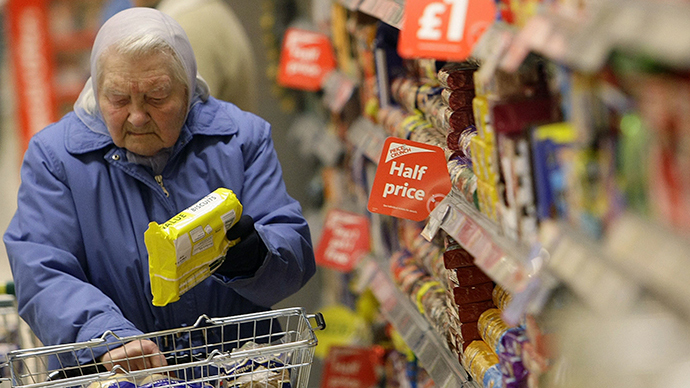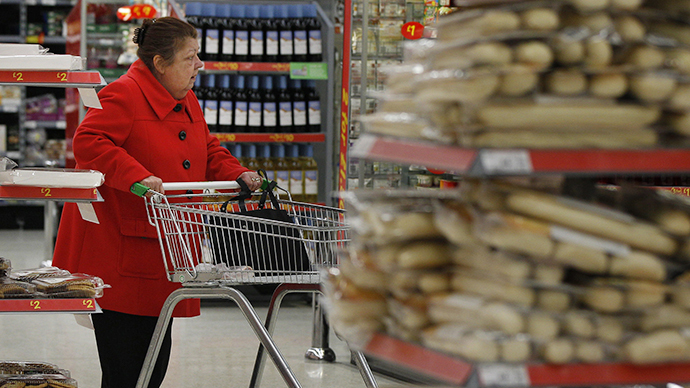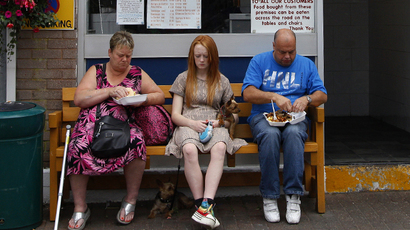UK worsens global hunger crisis by 'blocking reforms on food speculation'

The UK is being accused of attempts to block EU reform to prevent food speculation. It took EU negotiators three years to agree on a regulation against speculation by banks and hedge funds which drives up food prices, aggravating the global hunger crisis.
The deal introduces new rules to limit speculation on products
linked to what people eat, such as wheat, corn, soybeans or
sugar. The new controls will set limits on the number of food
contracts that banks and other finance institutions can hold,
pushing traders to open their activity to greater public
scrutiny.
Representatives of the EU's 28 governments and EU lawmakers
clinched the deal on the outlines of the Markets in Financial
Instruments Directive (MiFiD) in Strasbourg late on Tuesday. The
bloc's executive arm, the European Commission, has promised that
the rules on agricultural derivatives would "contribute to
orderly pricing and prevent market abuse, thus curbing
speculation on commodities and the disastrous impacts it can have
on the world’s poorest populations."
Organizations fighting global hunger welcomed the long-awaited
regulation, vital for people across Europe "struggling to
cope with high and volatile prices."
EU policy advisor from the international aid agency Oxfam
informed on the organization's website that the agreement
introduced limits on speculating "in spite of attempts by the
UK and other governments to block any meaningful reform."
According to Oxfam's EU policy advisor, the deal is "far from
perfect."
"Unjustified exemptions were granted to powerful lobbies and
limits will be set nationally, rather than at the European level.
There is a real risk, particularly in the UK, of ineffective sky
high limits triggering a regulatory race to the bottom between
European countries," Marc Olivier Herman warned.
He explained that new limits to the bets that speculators can
make will apply to contracts traded "over the counter"
and throughout the lifetime of the contracts. "This is good
news for millions in the developing world, who can spend up to 75
percent of their income on food, as well as producers, who rely
on stable food prices."
The agreement is part of the major European financial reform.
After it is officially approved by members of the European
Parliament and EU finance ministers in the coming months, it will
be included into national legislation in each of the 28 EU member
states.

Meanwhile, another anti-poverty group, the World Development
Movement (WDM) pointed out that the UK government’s opposition to
tough controls has resulted in "serious loopholes in the
regulation." Among the biggest drawbacks in the new rules is
that limits will be set at national rather than EU level, which,
according to WDM, risks a regulatory "race to the
bottom," with countries competing with each other to set
weaker limits.
"The UK’s role in watering down the regulation has been a
disgrace. The Treasury has put the profits of banks like Goldman
Sachs above the basic human need for food, with the result that
the new rules could be too weak to be effective," director
of the World Development Movement Nick Dearden stated, adding
that the current objective is to make sure that the limits are
set at a level that "properly tackles excessive
speculation."
He said the new regulation has only been introduced thanks to
public outrage over food speculation, and "the fact that the
EU has listened to that anger is a victory for public
pressure."
According to WDM, a leaked document earlier revealed attempts by
the UK government to prevent proposed controls on food
speculation ahead of negotiations in Brussels in November.
The memo, sent by UK negotiators to their counterparts from other
European countries, allegedly acknowledged their opposition to
strict limits on the amount that banks and other financial
players can speculate in commodity derivative markets.
The UK has been pushing for the continuation of a system of
self-regulation, which gives speculators carte blanche to cause
spikes in foodstuff prices. The World Development Movement said
that by trying to weaken regulation to curb food speculation, the
UK government is putting the profits of big banks before the
right of people to access to food.
"Yet again, our government is doing the banks’ dirty work for
them. The UK should be backing tough controls to stop banks
gambling on hunger, instead of throwing a wrecking ball,"
Dearden noted in November.
According to WDM, five banks made an estimated total of 2.2
billion pounds from speculating on food, including wheat, maize
and soy, between 2010 and 2012. Goldman Sachs, Barclays, Deutsche
Bank, JP Morgan and Morgan Stanley were the top five global
investment banks involved in global commodity markets, making an
estimated 640 million pounds ($1 billion) from speculating on
food in 2012 alone.














